Unable to back down, Israel and Hezbollah move closer to all-out war
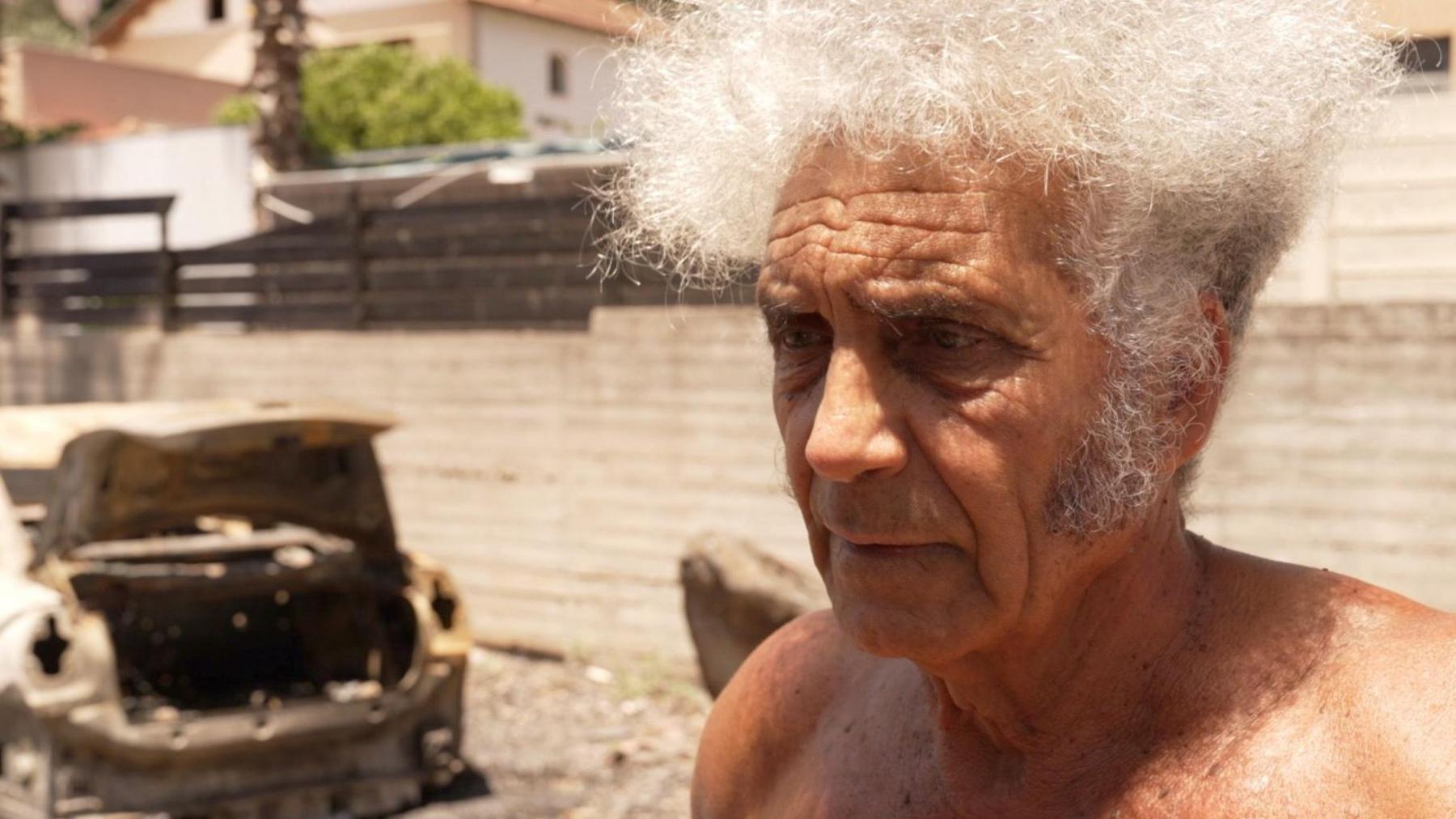
"Every day, every night: bombs. [It’s a] problem," David Kamari told the BBC
- Published
Full-scale war between Israel and Hezbollah would be "a catastrophe", the UN Secretary-General says. But to David Kamari, who lives under near-daily fire on the Israeli side of the border, it would be a solution.
Last month, a Hezbollah rocket fired from Lebanon landed in his front garden in the border town of Kiryat Shmona, cracking his house in several places and filling it with rubble.
He points out the gaping holes where shrapnel sliced through the walls, missing him by inches. And then to the hills above us, where Hezbollah-controlled territory begins.
"Every day, every night: bombs. [It’s a] problem," he said. "And I was born here. If you live here one night, you go crazy."
David is still living in his rubble-filled house, pieces of shrapnel entangled with the remains of his television set. Outside is the blackened relic of his car, burned by the fire that swept through his front yard after the rocket hit.
Most of the population of Kiryat Shmona was evacuated after the 7 October Hamas attacks, as Hezbollah rockets began raining down in support of their Palestinian ally.
David is one of the few who stayed. "I’ve lived here 71 years," he said. "I won’t go. I was in the army, I’m not afraid."
His solution? "War with Hezbollah; kill Hezbollah," he says.
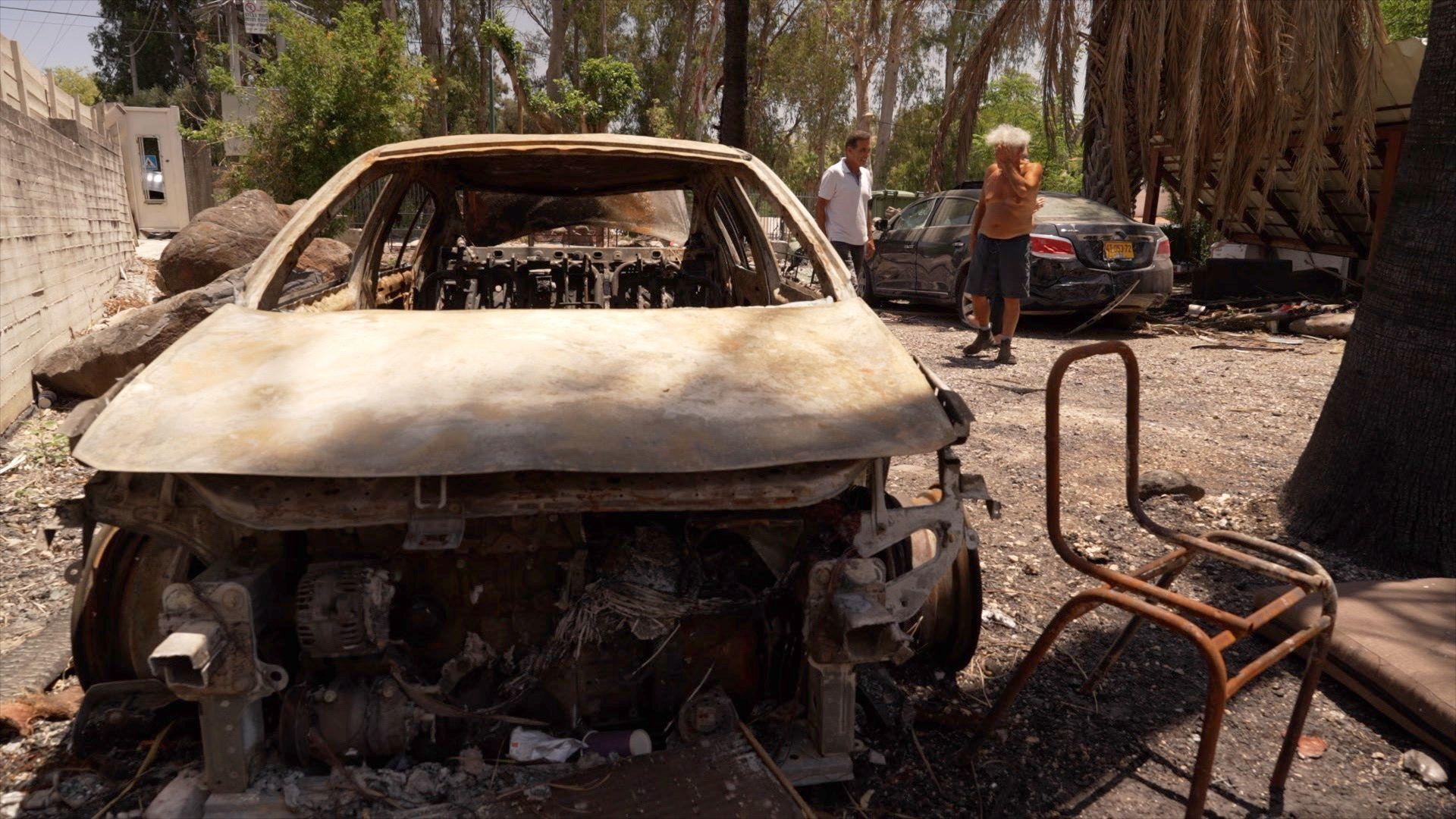
David's property has been hit by rocket fire: "If you live here one night, you go crazy."
Israel has been striking back hard against Hezbollah, killing senior commanders and hitting targets further inside Lebanon.
Hezbollah has sent larger volleys of drones and missiles across the border this month, and threats on both sides have increased. Earlier this week, the group published drone footage of military installations and civilian infrastructure in the Israeli city of Haifa.
Tough talk has long been part of a mutual strategy of deterrence, with both sides seen as wary of all-out war.
But as the tit-for-tat conflict grinds on, and more than 60,000 Israelis remain evacuated from their homes in the north, there are signs that both Israel’s leaders and its citizens are prepared to support military options to push Hezbollah back from the border by force.
The mayor of Kiryat Shmona, Avichai Stern, shows me the site where a rocket hit a street near his office last week.
"I don't think there is any country in the world would accept daily fire against its citizens," Mayor Stern said.
"And sitting here like lambs to slaughter, waiting for the day they will raid us like we saw in the south, that’s not acceptable. Everyone understands that the choice is between war now or war later."
The dangerous stalemate here hinges largely on the war Israel is fighting more than 100 miles (160km) to the south in Gaza.
A ceasefire there would help calm tensions in the north too, but Israel’s Prime Minister Benjamin Netanyahu is keeping both conflicts going, mortgaged by his promise to far-right government allies to destroy Hamas before ending the Gaza War.
Earlier this week even the Israeli military spokesman said this goal may not be realistic.
"The idea that we can destroy Hamas or make Hamas disappear is misleading to the public," Rear Admiral Daniel Hagari told Israeli TV.
On the Lebanese side of the border, where more than 90,000 people have been evacuated, the mood among those who have stayed is similarly grim.
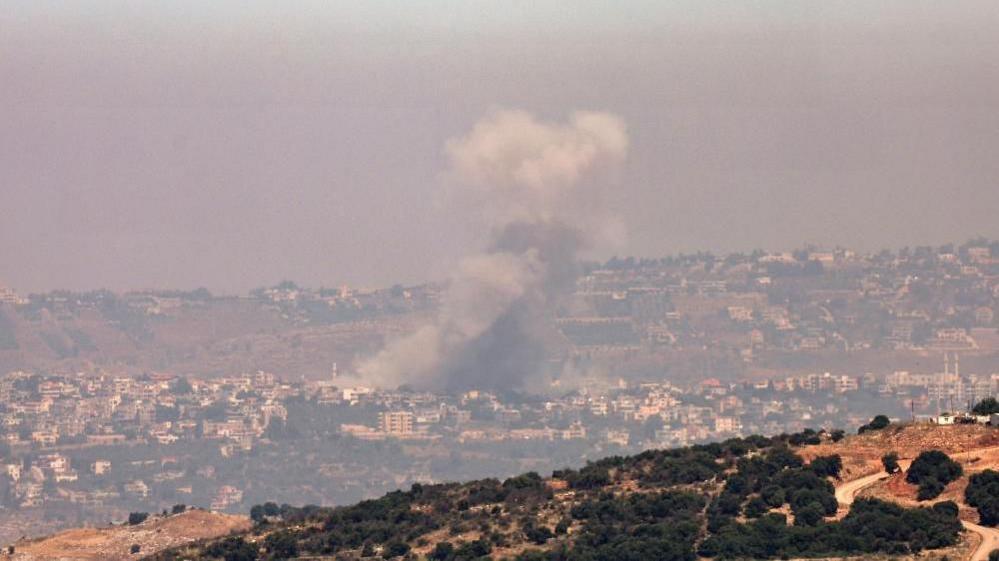
Israel has been hitting southern Lebanon with air strikes
Fatima Belhas lives a few miles (7km) from the Israeli border, near Jbal el Botm.
In the early days, she would shake with fear when Israel bombed the area, she says, but has since come to terms with the bombardments and no longer thinks of leaving.
"Where would I go?" she asked. "[Others] have relatives elsewhere. But how can I impose on someone like that? We have no money."
"Maybe it is better to die at home with dignity," she said. "We have grown up resisting. We won’t be driven out of our land like the Palestinians."
Hussein Aballan recently left his village of Mays al Jbal, around 6 miles (10km) from Kiryat Shmona, on the Lebanese side of the border.
Life there had become impossible, he said, with erratic communications and electricity, and almost no functioning shops.
The few dozen families left there are mainly older people who refuse to leave their homes and farms, he told the BBC.
But he backed the Hezbollah assault on Israel.
"Everyone in the south [of Lebanon] has lived through years of aggression, but has come out stronger," he said. "Only through resistance are we strong."
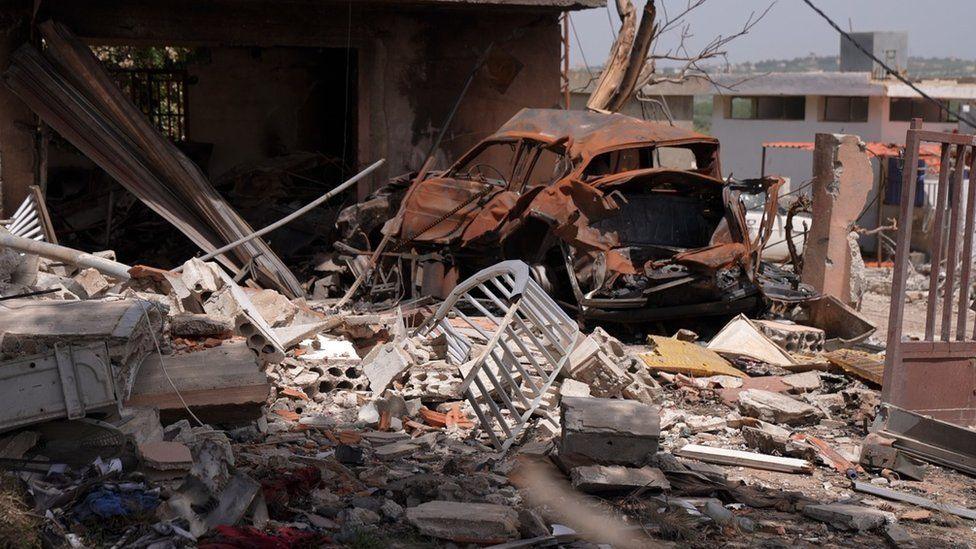
The BBC saw damage in southern Lebanon from Israeli fire in May
As difficult as this border conflict is for people on both sides, a full-scale war would lift the crisis onto a different scale.
Some residents of Beirut are keeping suitcases packed and passports ready, in case of all-out conflict, and the Hezbollah leader, Hassan Nasrallah, said this week that nowhere in Israel would be spared.
Hezbollah is a well-armed, well-trained army, backed by Iran; Israel, a sophisticated military power with the US as an ally.
Full-scale war is likely to be devastating for both sides.
Israel and Hezbollah play with fire as fears grow of another war
- Published19 June 2024
Israelis using gardening tools to fight wildfires sparked by Hezbollah rockets
- Published5 June 2024
Southern Lebanon: BBC sees air strike destruction in deserted towns
- Published1 May 2024
The UN Secretary-General, Antonio Guterres, said it would be a “catastrophe that goes […] beyond imagination”.
The problem for Israel is how to stop the rockets and get its people back to the abandoned northern areas of the country.
The problem for Hezbollah is how to stop the rockets when its ally, Hamas, is being pounded by Israeli forces in Gaza.
The longer that situation grinds on, the more the risks of a miscalculation increase, and the more Israel’s government is under pressure to resolve the situation.
The Hamas attacks on 7 October changed security calculations in Israel. Many of those with homes near the border – and some of those in positions of power – say the kind of agreement made with Hezbollah in the past is no longer enough.
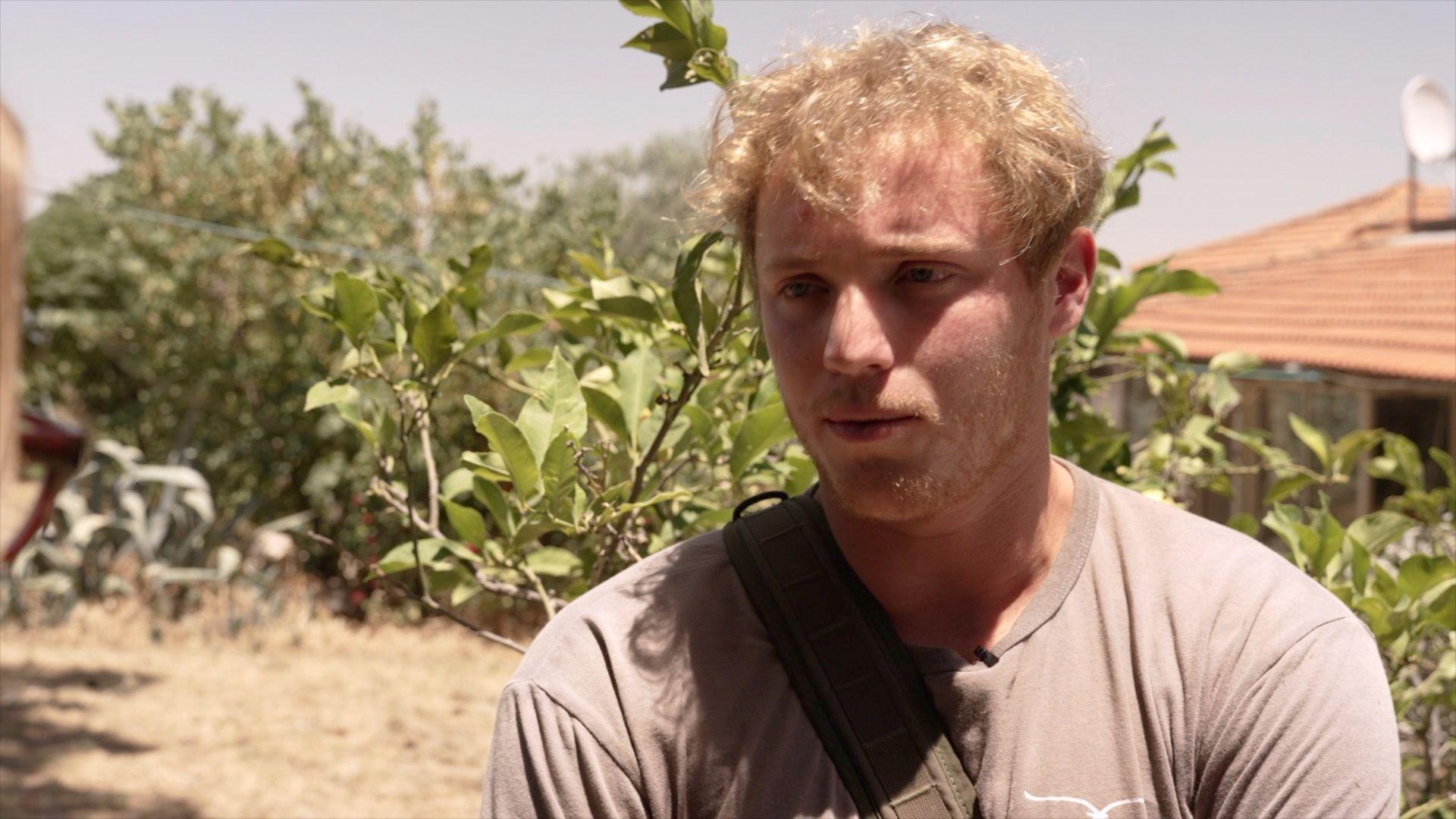
Tom Perry says Israel's leaders have failed and should quit
Tom Perry lives in kibbutz Malkiya, right up against the Lebanese border fence. He was out drinking with friends when a Hezbollah rocket slammed through the front of his house earlier this month.
"I think the Secretary-General’s warning is right – [war] will be a catastrophe to the area," he said.
"But unfortunately it looks like we have no other option. No agreement lasts forever, because they want death for us. We are doomed to wars forever, unless Israel can eliminate Hezbollah."
Israel’s leaders lost all credibility after the 7 October attacks, he says, and don’t have a strategy to deliver peace.
"They need to quit – all of them. The biggest failure of our army and our country was 7 October, and they were our leaders. We don’t need these leaders."
Demands for political change are likely to increase when Israel’s conflicts end.
Many believe Israel’s prime minister is playing for time: caught between growing demands for a ceasefire in Gaza, and growing support for a war in the north.